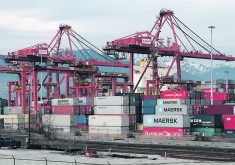GUELPH, Ont. — Ontario farmland values may be about to soften, according to a speaker here at an economic outlook conference on May 26.
“If I have to look in the crystal ball, I’d say you can expect changes in farmland prices next year, farmland prices going down,” University of Guelph agricultural economist Brady Deaton Jr. said.
Prices have already softened in Iowa, which tends to mirror Ontario, by nine percent but that drop needs to be put into context. Even with the fall, Iowa farmland prices are still higher than they were two years ago and five years ago, Deaton said.
Read Also

Farming Smarter receives financial boost from Alberta government for potato research
Farming Smarter near Lethbridge got a boost to its research equipment, thanks to the Alberta government’s increase in funding for research associations.
There are certain parallels to today’s situation with what occurred in the 1970s, but also differences.
Parallels include dramatic increases in commodity prices and farmland values for both periods. What’s different is that while net farm in-come remained relatively flat in the 1970s, it’s risen over the past few years and farmers have also enjoyed low interest rates.
When the farm crisis hit in the early 1980s, interest rates approached 23 percent.
Another important consideration in Ontario is the influence of urban areas, which tends to inflate values beyond their agricultural potential. Deaton said the Greater Toronto Area is now the fourth largest metropolitan area in North America.
J.P. Gervais, chief agricultural economist with Farm Credit Canada, said there is a possibility that farmland values in Ontario could be decline but for now the market is hot.
“You’re still seeing double digit growth for farmland values in Ontario,” he said.
Perhaps the weakest market is in Alberta, Gervais said. Depending on the direction the price of oil takes, he said a drop to zero growth in farmland values this year wouldn’t be surprising.
He does expect Saskatchewan values to increase further, remaining in the double digit range. Values in-creased by close to 30 percent in 2013 and by more than 15 percent last year.
There’s similar strong growth in Manitoba.
In Ontario, farmland values in-creased by 30 percent in 2012, about 15 percent in 2013 and more than 10 percent last year.
According to Steve Duff, senior economist with Ontario’s agriculture ministry, farmland values in 2014 averaged $8,400 per acre. However, some land sold in the vicinity of $25,000 per acre.
In Quebec, the increase was more than 25 percent in 2012, close to 25 percent in 2013 and around 15 percent last year.
Deaton talked about the phenomena of foreign farmland ownership in Canada. The best numbers put it around one percent, similar to the US where 1.7 percent of farmland and forest land is foreign owned.
The country with the biggest stake in U.S. farm and forest land is Canada, which may be a surprise to some, Deaton said.
Foreign and other non-farmer ownership of farmland can have an impact on values but Deaton suspects this is likely to be regional in nature rather than having a broad impact.
He encouraged those attending the conference to take a look at the recent Losing Our Grip study released by the National Farmers Union this spring.
Deaton’s own research looks at farmland rental trends.
If you’re looking for a deal in Ontario, renting from an active farmer may be a poor choice. According to 2013 Ontario survey data, active farmers charged more than any other group in the province.
Retired farmers and investment companies also charged a good dollar for farmland rental. Widowers and non-farmer rural residents tended to charge significantly less.
Another interesting finding relates to how farmers treat the land they own compared to the land they rent. They’re more likely to plant cover crops on owned land but that tends to fade as the length of lease agreements increases.
















